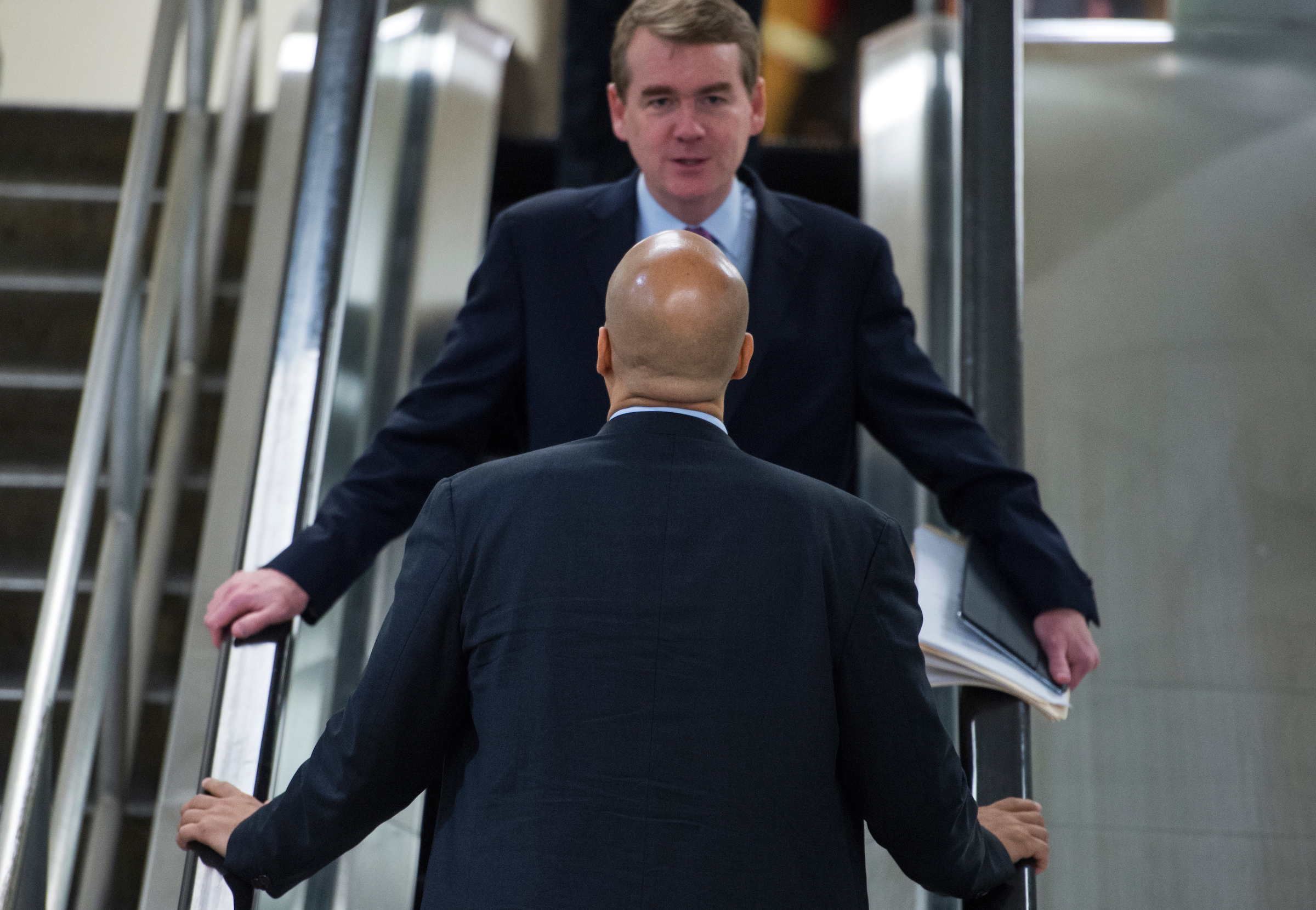Michael Bennet went viral. Now what?
Colorado Democrat running digital ads about his speech in early primary states

It’s been two weeks since Colorado’s senior senator made a national splash with a Senate floor speech that went viral.
But you’d be forgiven if you’d already forgotten about Michael Bennet. He hasn’t been included in most polling of the Democratic field and barely makes the cut in stories about potential candidates.
He says the two things — his speech and his presidential considerations — were unrelated.
“What is Michael doing?” was the general reaction from his staffers who found out about his unplanned floor remarks the same way most of Capitol Hill did — by glancing up at the TV in their office on Jan. 24.
But even if it wasn’t a premeditated political performance, Bennet’s speech has allowed him to further test the presidential waters. His campaign has been buying Facebook ads promoting stories about the speech in Iowa, New Hampshire, South Carolina and Nevada. He was already planning to release a book later this year.
But as the 2020 circus revs up, and with a fellow Coloradan already pounding the primary-state pavement, Bennet faces the same question as other members of Congress eyeing the White House: What sets him apart?
Also watch: First 2020 Senate race ratings are here
‘What’s after the comma?’
After Bennet’s speech, his team received more media requests than it could accommodate. So many Americans called his office — 2,000 in just over 24 hours — that its call system crashed.
A cut of the speech became the most-viewed C-SPAN Twitter video ever, and it’s now the second-most-viewed video across all C-SPAN digital platforms behind a clip of President Barack Obama’s speech to the 2015 White House correspondents’ dinner.
The mild-mannered Bennet has been fiery before, like in a December 2017 floor speech against the GOP tax plan. C-SPAN cameras were rolling then too, but those remarks didn’t catch on in nearly the same way.
It was Sen. Ted Cruz whose floor speech urging Democrats to back a bill to pay the Coast Guard during the government shutdown that set Bennet off last month.
“These crocodile tears that the senator from Texas is crying for first responders are too hard for me to take,” Bennet said, his voice rising as he recalled Cruz’s role in shutting down the government in 2013, which held up emergency funds for Colorado floods.
If there’s a Republican that Democrats and even Republicans love to hate, it’s Cruz.

Colorado-based Democratic strategist Rick Ridder has met with both Bennet and former Gov. John Hickenlooper (Bennet’s former boss) in the past six months about 2020 bids. A former presidential campaign manager and adviser, Ridder always asks the same question about candidates: “What comes after the comma?”
Right now, Ridder said, that parenthetical phrase could read: “‘Michael Bennet, whose U.S. Senate floor speech ignited the enthusiasm of millions of voters …’”
“Now you got something after the comma,” Ridder said. “And that’s important because when you’ve got 30 different people sitting on stage with you, you’ve gotta figure out something that people remember.”
So was that moment Bennet’s climax or just the beginning of a long-shot bid for president among an already crowded field?
For now, Bennet and his staff are shying away from the presidential hype. With three kids to think about, the senator may be genuinely undecided. Holding back may also be a shrewd strategy to focus on what he’s known for — policy making — and let the other candidates trip over themselves before entering the fray.
‘Pragmatic progressive’
Bennet isn’t an obvious man of the people. Born into an elite, well-connected family, his father was the president of NPR and later Wesleyan University, from which Bennet also graduated. His brother, James Bennet, is the editorial page editor of The New York Times.
His temperament is an obvious foil to President Donald Trump.
Those who know Bennet often describe him as a “pragmatic progressive,” alluding more to his style of politics — namely, a willingness to seek solutions across the aisle — than to any centrist leanings.
Bennet was one of just four Democrats to oppose the filibuster of Supreme Court Justice Neil M. Gorsuch in 2017, and he voted against the fiscal cliff deal four years earlier. He’s long been worried about the functionality of government, a central theme of his January monologue.
As a member of the so-called gang of eight on immigration, he helped craft bipartisan legislation that passed the Senate but ultimately failed in the House, a source of frustration that bubbled up in last month’s speech.
Colorado Republicans like Dick Wadhams, a former state GOP chairman, thinks Bennet’s too liberal for the state. But even he credits him for working hard, having good constituent services and getting around the state.
“I’ve told him for a long time, for over two years, that he ought to look at running for president,” said Montana Sen. Jon Tester, a friend and foosball partner, adding that he hasn’t yet seen Bennet on the stump.
Critics on the left, though, argue Bennet has compromised too much, like when he voted for the Keystone XL Pipeline in 2014 or voted to roll back some Dodd-Frank banking regulations last spring. That vote puts him on the opposite side of almost every other senator in the 2020 mix.
On health care, a major issue in the burgeoning Democratic field, Bennet has his own proposal for a public option, known as the Medicare-X Choice Act, introduced with Virginia Sen. Tim Kaine in 2017 and co-sponsored by several presidential contenders.
Fast learner
Bennet had never run for office before he came to the Senate.
The former lawyer had dabbled in business when he first came to Colorado, then helped elect Hickenlooper (a fellow Wesleyan alumnus) mayor of Denver. Hickenlooper made him his chief of staff and later superintendent of public schools. (Those who know both men say their friendship wouldn’t dissuade either from both running for president.)
Getting to the Senate was the easy part — Gov. Bill Ritter appointed Bennet to the vacant Senate seat left by Interior Secretary Ken Salazar in 2009. Staying there has required a mix of hard work, smart campaigning and luck.
His first political test came in a 2010 primary. Former President Bill Clinton backed Andrew Romanoff, the former state House speaker, while Bennet had Obama’s support. Despite being the incumbent, Bennet ran as the political outsider against a man who’d spent years in politics — and won.

“It was a pretty big learning curve,” 2010 manager Craig Hughes said of Bennet’s head-first dive into campaigning. But his skills, he added, were “underrated.”
Bennet went on to defeat tea party candidate (and future congressman) Ken Buck in the fall, winning his first full term in a terrible year for Democrats. He served as chairman of the Democratic Senatorial Campaign Committee in 2014, another tough cycle for the party. Two years later, Colorado Republicans once again nominated a extreme candidate, and although the final results were closer than expected, Bennet didn’t face much of a race in winning a second term.
Bennet ended 2018 with $1.5 million in the bank. He wouldn’t enter the presidential sweepstakes with as wide a fundraising base as some contenders. And with another Midwestern senator — Minnesota’s Amy Klobuchar — likely getting in the race this weekend, Bennet may need to act soon to lock up donors — and national attention.
“The challenging thing for him is reducing what he is doing, what he has done and wants to do into sound bites,” said Hughes, who also advised Bennet’s 2016 run.
But maybe that matters less right now.
“Presidential primaries are not won by 30-second ads. They’re won by town halls, by conversations, sometimes word of mouth, winning people over,” Hughes said.
“That means real answers, and that’s where he can shine.”





